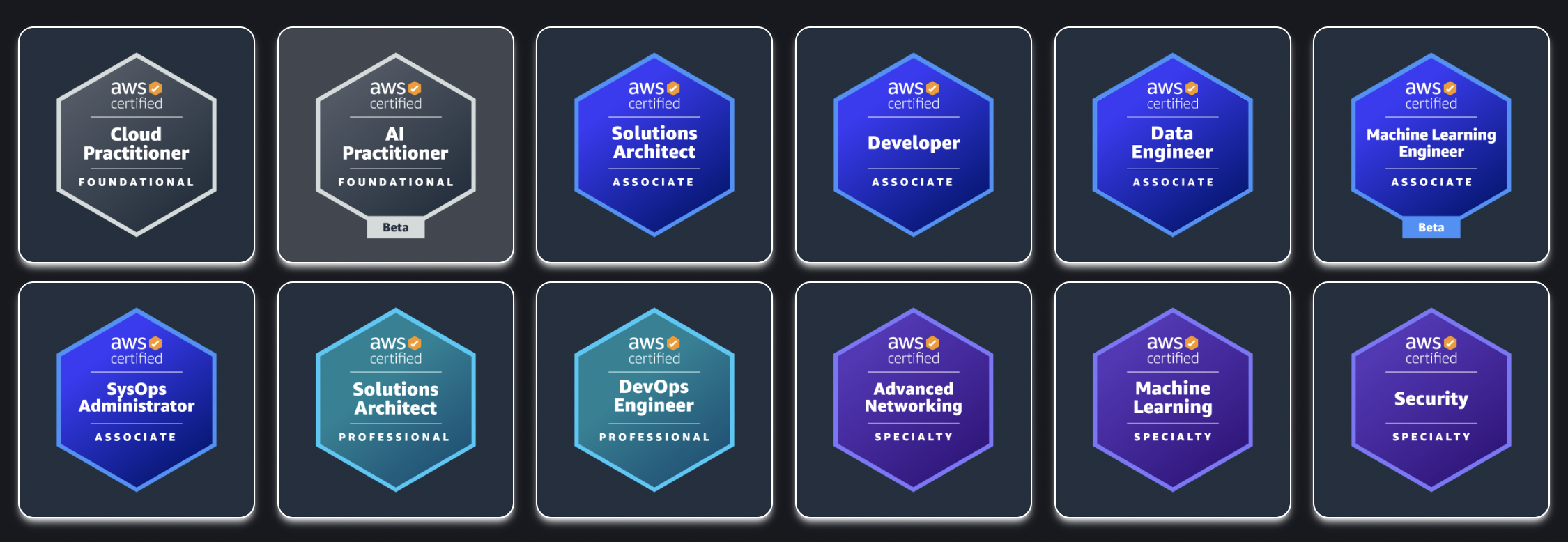DevOps isn’t just a trend – it’s a fundamental shift in how businesses build, deploy, and maintain applications. And as more companies adopt this approach, the demand for skilled DevOps professionals has skyrocketed.
If you’ve been working in IT, software development, or system administration, you’ve likely come across the need for faster deployments, improved collaboration, and automation. This is where DevOps certification comes into play. But how exactly can this certification help you grow in your career, and what are the best certifications to consider?
Top DevOps Certifications to Consider
With many certifications available, it’s essential to choose one that aligns with your career goals and existing skill set. Below are some of the most recognized and valuable DevOps certifications you should consider:
- AWS Certifications
AWS Certifications are tailored for professionals managing AWS-based applications. They cover topics like continuous delivery (CD), infrastructure as code (IaC), and monitoring. Ideal for those seeking to advance their cloud-based DevOps skills with AWS.
- Microsoft Certified: DevOps Engineer Expert
For those working in Azure environments, this certification provides a comprehensive understanding of DevOps practices, including CI/CD pipelines, version control with GitHub, and deployment using Azure DevOps. It’s a great choice if your organization uses Microsoft’s suite of services and tools.
- Google Professional DevOps Engineer
If you’re working with Google Cloud, this certification is perfect for mastering DevOps practices on that platform. It covers service monitoring, infrastructure automation, and CI/CD implementation on Google Cloud. The exam tests both your technical knowledge and your ability to manage real-world cloud-based DevOps projects.
- Certified Kubernetes Administrator (CKA)
Kubernetes is a core technology in modern DevOps, especially for container orchestration. The CKA certification by the Cloud Native Computing Foundation is highly regarded for anyone wanting to work with Kubernetes clusters. It focuses on configuring, maintaining, and troubleshooting Kubernetes environments.
- Docker Certified Associate
Docker is a crucial tool in containerization, which is a key part of the DevOps workflow. This certification validates your ability to work with Docker, manage images, and build scalable applications using container-based infrastructure.
- Red Hat Certified Specialist in Ansible Automation
If you’re interested in infrastructure automation, this Red Hat certification focuses on automating tasks using Ansible. You’ll learn to manage large-scale deployments, streamline configuration management, and automate application deployments.
Certification Pathways: AWS offers role-based and specialty certifications for various job roles like Solutions Architect, Developer, or SysOps Administrator. Choose the path that aligns with your current or desired role.
Explore More: https://aws.amazon.com/certification/
Learn More: https://learn.microsoft.com/en-us/credentials/certifications/devops-engineer/
Learn More: https://cloud.google.com/learn/certification/cloud-devops-engineer
Learn More: https://kubernetes.io/training/
Learn More: https://www.docker.com/resources/trainings/
Learn More: https://www.redhat.com/en/services/certification/rhcs-ansible-automation
Having a DevOps certification is your entry ticket to these high-paying and in-demand roles. It validates your expertise and signals to employers that you have the skills necessary to hit the ground running.
Hands-On Skills You Can Immediately Apply
A DevOps certification isn’t just about theoretical knowledge. It’s built around practical, real-world applications that can be implemented in your current job. When you earn a DevOps certification, you’ll learn essential skills such as:
- Automation: Master tools like Jenkins, Puppet, and Ansible to automate repetitive tasks and reduce human error.
- Continuous Integration/Continuous Deployment (CI/CD): Learn how to streamline software delivery using CI/CD pipelines that ensure code is always ready for production.
- Cloud Computing: Get hands-on experience with cloud platforms like AWS, Azure, or Google Cloud, which are integral to DevOps operations.
- Monitoring and Log Management: Use tools like Prometheus, Grafana, and ELK Stack to monitor infrastructure, track performance, and troubleshoot problems.
These skills are immediately applicable to your daily work, whether you’re tasked with maintaining infrastructure, writing code, or managing deployments. The practical knowledge you gain from certification will allow you to solve complex problems faster and more efficiently.

DevOps has transformed from a niche practice to a mainstream methodology across industries. The core advantage of DevOps lies in its ability to break down silos between software development and IT operations teams. Companies of all sizes are adopting DevOps to accelerate software development and improve collaboration between teams. This shift has created a huge demand for roles such as:
- DevOps Engineer
- Site Reliability Engineer (SRE)
- Cloud Engineer
- Automation Architect
- Release Manager
Having a DevOps certification is your entry ticket to these high-paying and in-demand roles. It validates your expertise and signals to employers that you have the skills necessary to hit the ground running.
If you're aiming to advance your career in IT, software development, or systems administration, a DevOps certification can be a game-changer.
Increased Career Opportunities in High-Demand Roles
- Enhanced Skills and Knowledge
- Increased Job Opportunities
- Higher Salary Potential
- Career Flexibility
- Improved Collaboration and Efficiency
- Keeping Pace with Technological Trends
- Recognition and Credibility
DevOps bridges the gap between software development and IT operations, fostering collaboration between the two to improve efficiency and deliver better products. A certification program equips you with essential skills such as automation, CI/CD (Continuous Integration/Continuous Deployment), infrastructure as code (IaC), and cloud technologies.
By acquiring these specialized skills, you can become proficient in popular DevOps tools like Jenkins, Docker, Kubernetes, Git, and Ansible. This deep understanding of the DevOps lifecycle helps you handle complex projects more effectively, making you a valuable asset to any team.
The job market for DevOps professionals is booming. According to various industry reports, companies are actively seeking individuals with DevOps expertise to drive digital transformation. Roles like DevOps Engineer, Site Reliability Engineer (SRE), Release Manager, and Cloud Engineer are in high demand.
A DevOps certification on your resume showcases your commitment to mastering DevOps practices, giving you a competitive edge over other candidates. Employers value certified professionals because they have verified knowledge and skills that can be applied from day one.
One of the most compelling reasons to pursue a DevOps certification is the potential for a higher salary. As organizations seek to hire certified professionals to ensure their operations run smoothly and efficiently, they are willing to offer attractive compensation packages.
According to research, DevOps engineers are among the top-paid professionals in the tech industry. Certifications can further increase your earning potential, signaling to employers that you're not only capable but also up-to-date with the latest industry trends and tools.
A DevOps certification opens doors to various career paths. Whether you're a software developer looking to expand your knowledge in infrastructure or an IT operations professional aiming to improve your automation skills, DevOps brings together diverse roles and responsibilities.
Certified DevOps professionals can work in sectors ranging from finance and healthcare to e-commerce and technology, giving you the flexibility to switch industries while maintaining a high level of employability.
DevOps is all about collaboration and efficiency. Earning a DevOps certification teaches you not only the technical tools but also the cultural practices that promote teamwork, communication, and collaboration across departments. By mastering these aspects, you can help your organization reduce the development cycle, improve product quality, and deliver faster.
The certification program emphasizes real-world, hands-on experiences, helping you learn how to implement DevOps principles effectively in a business setting. This knowledge can drive efficiency in your current role and make you a leader in fostering a collaborative environment.
In an era where automation, cloud computing, and CI/CD pipelines are transforming the way businesses operate, having a DevOps certification ensures that you’re up-to-date with these trends. As DevOps continues to evolve, staying certified ensures that you remain relevant, agile, and able to adapt to new tools and technologies.
Certifications often come with access to continuous learning resources, workshops, and communities that keep you engaged with the latest in DevOps practices. This keeps your skills sharp and prepares you for the future.
A DevOps certification is a formal acknowledgment of your expertise. It’s a badge of credibility that signals to employers, colleagues, and clients that you have the skills necessary to lead and manage DevOps initiatives.
Conclusion
In an increasingly competitive job market, obtaining a DevOps certification can significantly boost your career prospects. From enhancing your technical expertise and increasing your earning potential to improving collaboration and staying ahead of technological trends, the benefits of certification are manifold.
If you're serious about making a mark in the tech industry, investing in a DevOps certification is a smart move. It can open up new opportunities, make you more marketable, and empower you to take on bigger and better challenges. So why wait? Take the next step in your career by exploring DevOps certification programs today.
